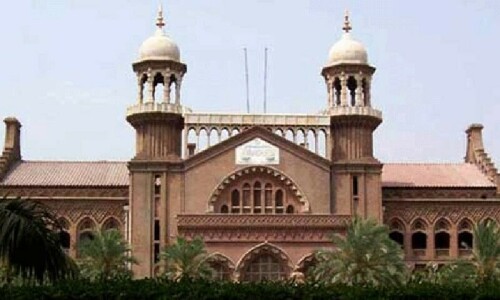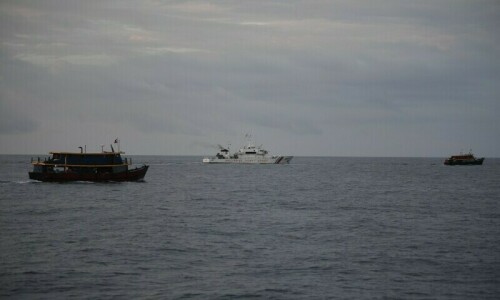The Panama Papers only confirm what has long been known. The unprecedented leak of confidential documents provides some insight into how the rich and powerful stash away their wealth in secret offshore companies. The trail leads to national leaders, top politicians, celebrities and businessmen around the world. Information gleaned from over 11 million documents from a Panama-based law firm is just the tip of the iceberg. The disclosure has triggered global investigations into secret offshore money.
Not surprisingly, the long list of those who use offshore tax havens include family members and associates of Prime Minister Nawaz Sharif, and the names of several other prominent politicians. Although some information about the Sharif family’s foreign assets is already known, details of the offshore companies owned by them is shocking, and has generated a political storm in the country.
The companies owned by Sharif’s sons and daughter were reportedly used to acquire properties worth millions of pounds in Britain. While not directly named in the leaks, the revelations pertaining to his apparently massive family business abroad have certainly put the beleaguered prime minister in a tight spot. It seems hard to believe that Sharif has no connection whatsoever with the wealth belonging to his children. The defence offered by the family and government spokesmen has so far failed to answer basic questions about the money trail.
Examine: Panama Papers: Secret accounts of the rich and powerful
It is not just the nation’s first family that is under scrutiny — the leaks have also exposed some 200 prominent Pakistani businessmen and politicians, raising questions about sources of their alleged hidden wealth. While the Saifullah family is on top of the list, former interior minister Rehman Malik, and many close associates of former president Asif Ali Zardari also figure in the scandal. Most shockingly, however, is the inclusion of a retired and a sitting high court judge in the list.
The Panama leaks provide just a glimpse of the money that has been taken out of the country.
The leaks provide just a glimpse of the money that has been taken out of the country. The revelations give credence to suspicions about the relationship between power and greed.
Surely it is not illegal to invest in offshore companies. But it is a fact that there are myriad ways in which ill-gotten wealth is channelled through offshore companies. The Panama Papers show that many dictators, drug traffickers and criminals have exploited offshore havens to hide their wealth. The leaks have linked over 70 current and former heads of state, including some of the most infamous dictators, to billions of dollars parked in offshore accounts.
Indeed, this is not the first time that information about the offshore financial assets of Pakistan’s political leaders has surfaced. It was revealed during the Swiss money-laundering case that Benazir Bhutto and her husband Asif Zardari were the beneficiaries of an offshore company registered in the British Virgin Islands, through which alleged kickbacks on government contracts were channelled. PPP leaders have denied the charge. But the latest leaks include the names of Benazir Bhutto and some of her close family members. It was not surprising to see the names of some of Zardari’s closest associates on the list.
Nawaz Sharif was also accused and investigated for money laundering in the 1990s. The investigation was, however, never completed after Sharif returned to power for the second time. A major defence of Pakistani leaders was that the cases were politically motivated. Of course, there is no denying that anti-corruption campaigns have often been used by successive governments to beat down their political opponents. But there is little doubt that most of the corruption cases against political leaders were valid, though they were never convicted by a court of law. It is also true that the corruption cases were used as a blackmailing tool and for political bargaining.
This biggest data leak in history has triggered protests in various countries. Thousands of people came out on the streets in Iceland demanding the resignation of their prime minister after a leaked document showed his wife owned a secret offshore company. France, India, Australia and New Zealand have ordered investigations against their nationals named in the Panama Papers for money laundering and tax evasion. British Prime Minister David Cameron has also come under pressure after the disclosure that his late father invested money in an offshore company in order to evade taxes.
Interestingly, the skeletons tumbling out of Panamanian closets have brought the PML-N and the PPP together in denouncing the leaks as a conspiracy to malign politicians. No one, however, can beat Rehman Malik, who has declared the Panama files a “RAW conspiracy” against him. The leaks tell a rags-to-riches story of a former FIA official who later became the country’s interior minister. Considering his alleged involvement in shady business dealings, is it a surprise that he was the former PPP government’s most powerful member?
The Panama leaks have exposed the links between power and greed. Not surprisingly, the offshore financial regime has become the biggest haven for often ill-gotten money accumulated by political leaders and businessmen. The Panama Papers have provided the most substantive evidence of how billions of dollars were taken out of the country. It may be true that not all the money invested in offshore companies was obtained through illegal means. But there is still a need for an impartial and across-the-board investigation.
Crying themselves hoarse over perceived conspiracies does not clear Pakistani politicians of allegations of misdeeds. Sharif needs to explain how some of the offshore companies were formed in the early 1990s, during his first term in office. It is hard for him to completely disassociate himself from the business empire that his family has built, in Britain and other countries over the past two decades, under the umbrella of offshore companies. The power elite should not wait for public dismay over the scandal to turn into outrage.
The writer is an author and journalist.
Published in Dawn, April 6th, 2016


















































